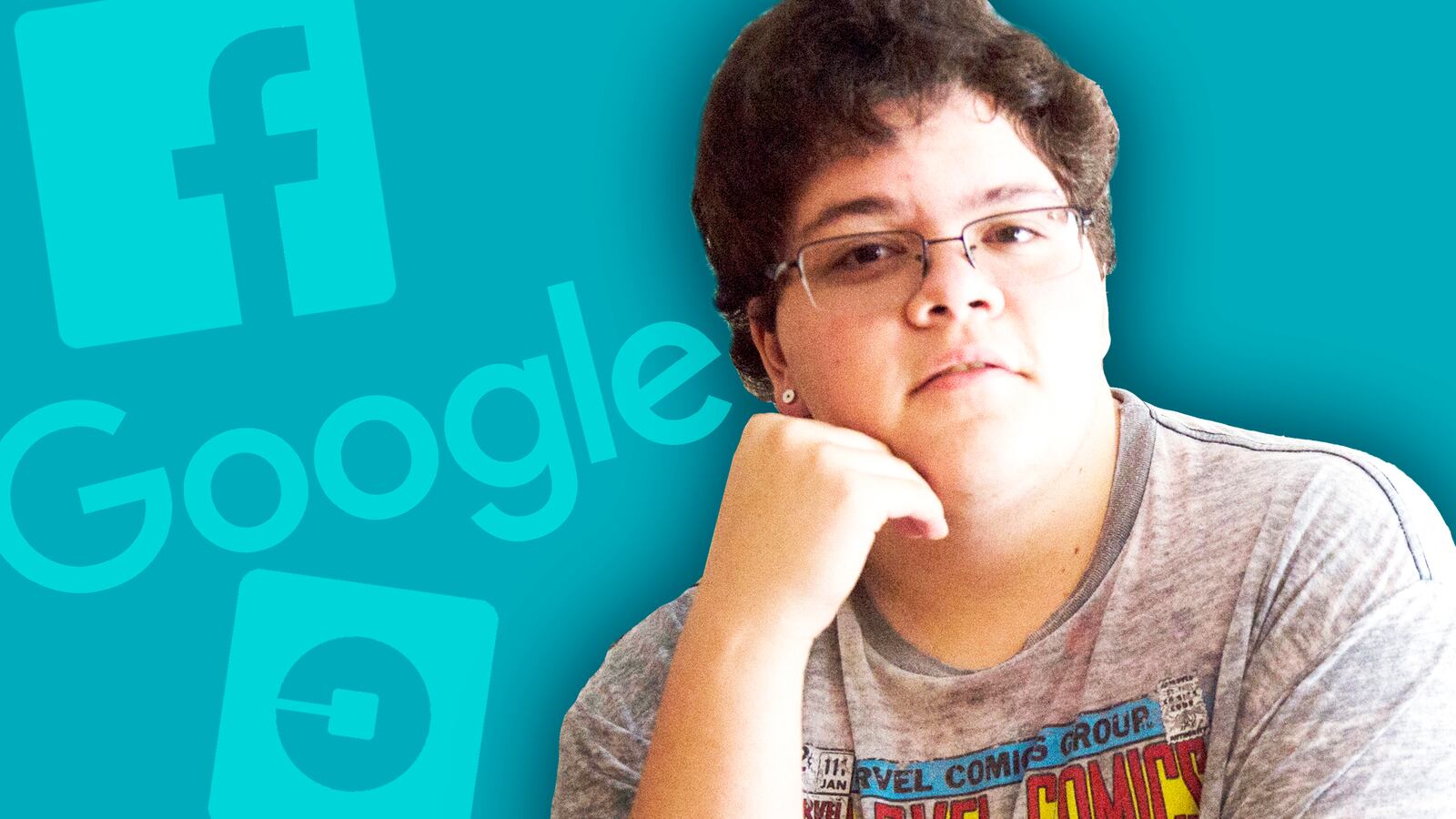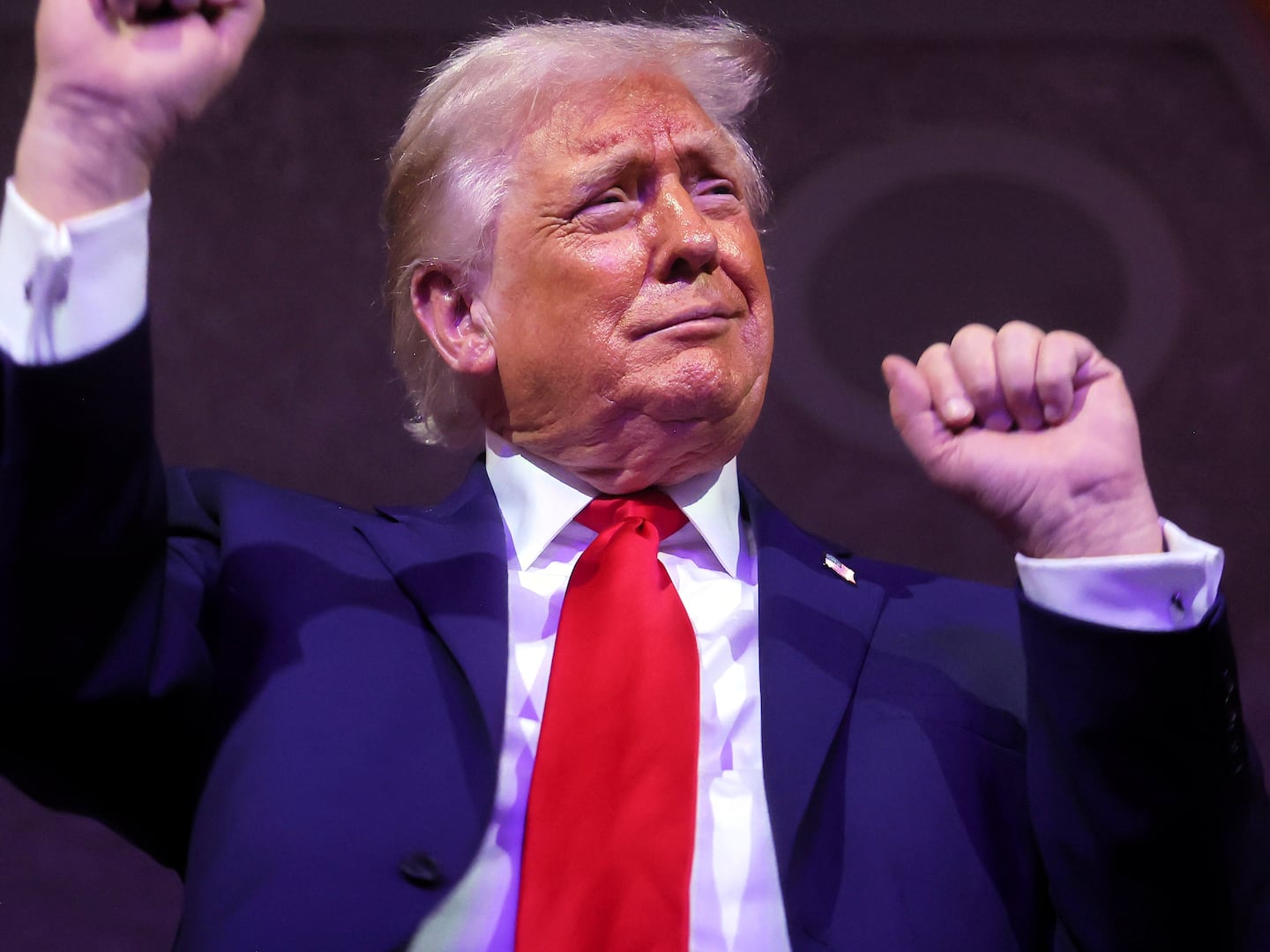Apple is standing with Gavin Grimm, the transgender boy at the center of an upcoming Supreme Court case that will decide whether or not he can use the boys’ restroom in his Virginia high school. So are Airbnb, eBay, and Intel. Microsoft, PayPal, Salesforce, Twitter and other major technology companies also signed an amicus brief, announced by the Human Rights Campaign on Thursday, in support of the 17-year-old Grimm.
But as Axios correspondent Ina Fried observed Wednesday night—and The Hill noted Thursday morning—there were some conspicuous absences from the list of signatories: Facebook, Google, and Uber.
All of these companies have taken public stands on anti-LGBT discrimination before—and have commented recently on the specific issue of restroom access for transgender students. So why aren’t their names on the list?
A source familiar with the companies who were approached for the amicus brief confirmed to The Daily Beast that Facebook, Google, and Uber were all invited to sign.
And when President Trump rescinded the Obama administration’s Title IX guidelines for transgender students two weeks ago, all three Silicon Valley giants immediately pushed back. Uber said in a statement, “We will continue to speak out against discriminatory actions and in favor of good policy that champions equality and inclusion for all.” Google said that the company was “deeply concerned to see a roll-back in transgender students’ rights.” And Facebook noted that they “stand for ensuring equal rights for everyone, including transgender students, and will continue to advocate for more rights instead of fewer.”
On Thursday morning, The Daily Beast reached out to Facebook, Google, and Uber asking why they had not signed the amicus brief. Google did not immediately respond to a request for comment.
A Facebook spokesperson directed The Daily Beast to the company’s previous statement on the Trump administration’s rollback of the Title IX guidance for transgender students and emphasized that the company has signed a letter opposing SB6, an anti-transgender “bathroom bill” in Texas. (Google has also signed that letter.)
But asked again if Facebook has any specific comment on their absence from the amicus brief, the spokesperson said, “Not at this point. I’ll let update you if we have anything to add.”
An Uber spokesperson—like the Facebook spokesperson—referred The Daily Beast to the ridesharing company’s previous statement on Trump rescinding the Title IX guidelines, which says that the company is “proud of [their] longstanding opposition to harmful initiatives aimed at the LGBT community.” (A source at Uber familiar with the matter, however, indicated that the company wanted to sign the amicus brief but simply missed the deadline to do so.)
The Human Rights Campaign, which organized the amicus brief, did not comment on the absence of Facebook, Google, and Uber. With regard to the 53 companies that did sign, HRC President Chad Griffin said in a press statement that they are “sending a powerful message to transgender children and their families that America’s leading businesses have their backs.”
“Across the country, corporate leaders are speaking out because they know attacking transgender youth isn't just shameful—it also puts the families of their employees and customers at risk,” Griffin said. “Transgender students like Gavin are entitled to the full protection of the law, and must be affirmed, respected and protected in the classroom and beyond.”
Facebook, Google, and Uber all have long records of supporting transgender employees and, more broadly, transgender rights. All three tech companies score 100 on the HRC’s Corporate Equality Index, which means that they all have comprehensive discrimination protections and offer transgender-inclusive health insurance. And none are strangers to the legislative or judicial battles that have cropped up around questions of transgender equality around the country.
In 2015, leaders from all three companies signed a call for nationwide discrimination protections for LGBT Americans. And when North Carolina passed its anti-transgender “bathroom bill” HB2, the CEOs of Facebook, Google, and Uber opposed it. The three companies have also endorsed successful legislation protecting transgender people from discrimination in the state of Massachusetts. (All three companies also signed a letter criticizing the Trump administration over his travel ban on seven Muslim-majority countries.)
Gavin Grimm’s forthcoming Supreme Court case, however, could be the most monumental decision on transgender rights in judicial history.
Shortly after he publicly came out as transgender, Grimm was forced by his Gloucester County, Virginia school board to use an “alternative” bathroom rather than continue to use the boys’ bathroom as he had been doing for over a month.
The ensuing court battle—in which Grimm has been represented by the ACLU—now hinges on a key question: Will the Supreme Court decide that transgender students are protected under Title IX’s ban on sex discrimination?
For transgender students, many of whom are severely bullied and face restrictions to restroom access in their schools, the stakes are high. And when the judicial stakes were similarly high for same-sex marriage, Google and Facebook were among the hundreds of companies who signed an amicus brief in support of Jim Obergefell in his landmark marriage equality case.
This time around, they’re not on a potentially history-making list. Google, Facebook, and Uber have all previously spoken out in support of transgender students—an act that carries weight given their sheer size, collectively representing over $100 billion in annual revenue. But by leaving their names off of the amicus brief, they may have missed a crucial opportunity to put their mouths where their money is.
Asked on a press call Thursday morning about the conspicuous absences on the amicus brief, ACLU attorney Chase Strangio pointed to the other companies who have signed.
“I don’t have any specific comment on that other than just to reiterate the breadth of support from the business community, the medical community, the faith community, and so many other places,” he said. “I don’t have any other knowledge about that.”






